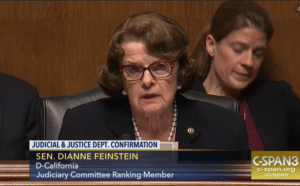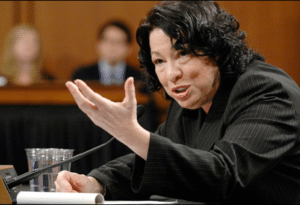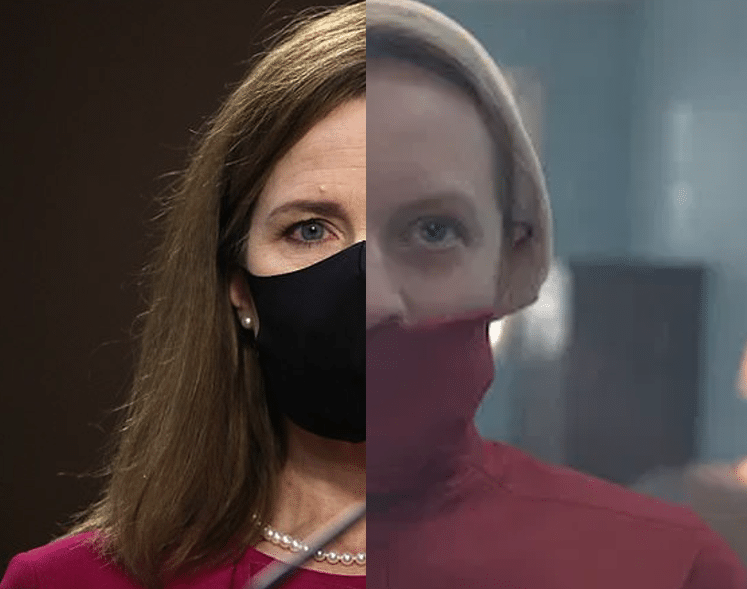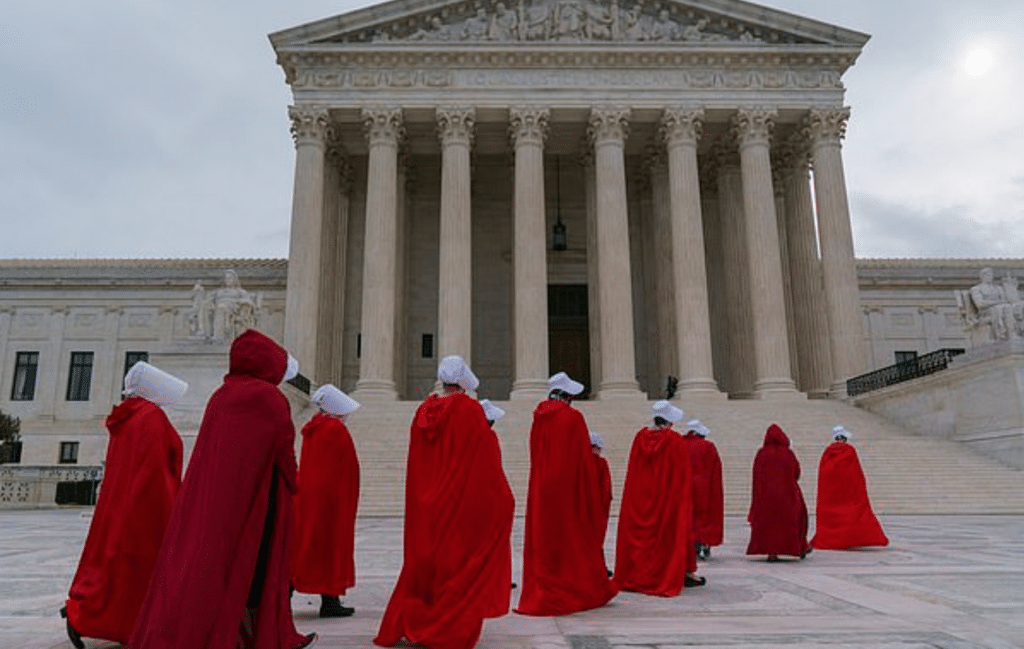According to reliable reports, Amy Coney Barrett is a member of People of Praise. It is a fringe Catholic group that requires its female members to live by a code of conduct so strict, it makes the code Margaret Atwood’s handmaidens are forced to live by seem promiscuous.
Among other chauvinistic strictures, members of Barrett’s group believe that
- wearing large belt buckles is sinful because they draw too much attention to the crotch;
- wearing perfume and cologne is sinful because they serve as aphrodisiacs;
- wearing anything but plain white cotton panties is sinful for similar reasons;
- dating, let alone sex, before marriage is sinful because any kind of intimacy outside marriage corrupts the spirit; and
- obeying one’s husband is virtuous because he is the head of all matters related to family life.
Of course, anyone who has read Atwood’s The Handmaid’s Tale (or seen the eponymously titled streaming series) will recognize those as the strictures of a dystopian society. Which is why it is self-evident that any woman who was reared on and now lives by them will have a very warped sense not just of personal freedom but of right and wrong.
Alas, Barrett is such a woman. But nothing disqualifies her from being appointed to the Supreme Court quite like the way she conspired with her group to deceive the Senate and, by extension, the American people.
Some wondered why Barrett has not disclosed or even acknowledged her connection to People of Praise and why the group appeared to try to hide her affiliation by deleting documents from its website. … The AP has documented extensive ties Barrett and her family have to the community, including that an old directory listed her as being one of the organization’s ‘handmaids,’ now called a ‘woman leader’. …
Particularly notable is that Barrett would be replacing the late Justice Ruth Bader Ginsburg, who in her career stood against practices such as women not being able to get credit cards in their own names.
(The Associated Press, October 11, 2020)
In law, we call this consciousness of guilt. In other words, it shows that Barrett and her group know full well that her membership (in what can fairly be described as a religious cult) makes her unfit to sit on the Supreme Court. Not to mention that she also conveniently forgot to list her public advocacy for right-wing nutjobs who want to ban all abortions, which they decry as infanticide.
In any case, this AP report raises two dispositive questions:
- Would you rest assured having a justice with Barrett’s dystopian life experience and inclination for dishonesty sitting on the Supreme Court?
- Do you believe that, after a lifetime of indoctrination with such close-minded strictures, Barrett will suddenly have the proverbial open mind, which is necessary to judge polarizing issues like the constitutionality of laws mandating a woman’s right to equal pay, a woman’s right to choose an abortion, a gay person’s right to marry, and every person’s right to healthcare (a.k.a. Obamacare)?
 No informed and fair-minded person can answer anything but “no” to both. Because there’s no denying that “the dogma lives loudly” in her. That, of course, is what Senator Dianne Feinstein (D-Calif.) famously observed during Barrett’s confirmation hearing for the Court of Appeals in 2017. Feinstein got a lot of flak for that. But she was right.
No informed and fair-minded person can answer anything but “no” to both. Because there’s no denying that “the dogma lives loudly” in her. That, of course, is what Senator Dianne Feinstein (D-Calif.) famously observed during Barrett’s confirmation hearing for the Court of Appeals in 2017. Feinstein got a lot of flak for that. But she was right.
Meanwhile, Democrats are trying to give the impression that religion has nothing to do with their opposition to Barrett’s nomination. By contrast, Republicans are trying to give the impression that religion has everything to do with it. Never mind that they are coming across like madmen punching themselves in the head while screaming at phantom attackers to stop punching them.
 Hell, if you didn’t know better, Republicans would have you believe that Democrats oppose Barrett being appointed to the Supreme Court for the same bigoted reason Southern Baptists opposed JFK being elected to the White House. Yet, to counter that, Democrats need only cite their wholehearted endorsement of the “supreme” friendship Democratic appointee Ruth Bader Ginsburg, who was Jewish, had with Republican appointee Antonin Scalia, who was Catholic.
Hell, if you didn’t know better, Republicans would have you believe that Democrats oppose Barrett being appointed to the Supreme Court for the same bigoted reason Southern Baptists opposed JFK being elected to the White House. Yet, to counter that, Democrats need only cite their wholehearted endorsement of the “supreme” friendship Democratic appointee Ruth Bader Ginsburg, who was Jewish, had with Republican appointee Antonin Scalia, who was Catholic.
But not even the most conservative Republican can deny that it would be fair to ask a male nominee how his membership in an all-white, all-male social club might inform his interpretation and application of the law. This is why Democrats should ignore the Republicans’ preemptive outrage and press Barrett to explain how her membership in a handmaiden group might inform hers. Failure to probe this influence would make them complicit in the fiction that she intends to sit on the Court, not even as the anodyne umpire Chief Justice John Roberts says a justice should be, but as a robot.
Apropos of which, it has become an article of political faith for conservative judges to pretend they are atheist when it comes to interpretation and application of the law. But that, and even the umpire analogy, is self-evident bullsh!t.
 Because here, for the record, is how Justice Sonia Sotomayor revealed the truth about the legal reasoning that informs the way all judges interpret and apply the law:
Because here, for the record, is how Justice Sonia Sotomayor revealed the truth about the legal reasoning that informs the way all judges interpret and apply the law:
In 2001, Sonia Sotomayor, an appeals court judge, gave a speech declaring that the ethnicity and sex of a judge ‘may and will make a difference in our judging.’
‘Whether born from experience or inherent physiological or cultural differences,’ she said, for jurists who are women and nonwhite, ‘our gender and national origins may and will make a difference in our judging.’
(The New York Times, May 14, 2009)
And Sotomayor’s view holds notwithstanding all the jurisprudential blather you might hear about constitutional originalism or statutory textualism.
Finally, much is being made about Trump and Republicans rushing Barrett’s appointment so she can cast a deciding vote to strike down Obamacare and affirm post-election claims to ensure his re-election (a la Bush v. Gore 2000).
But, as I predicted in my September 19 commentary on the death of RBG, Barrett is bound to disappoint Trump. This, just as his two other appointees (namely Neil Gorsuch and Brett Kavanaugh) did when they ruled against him in the landmark case regarding his taxes and financial records.
After all, Trump has made such a public spectacle of what he expects of her, Barrett’s conflict of interest would be so obvious, she would have to recuse herself in both cases – as a matter of law. Because there’s simply no denying that he and his Republican enablers have given just cause to question the impartiality of any vote she might cast.
Of course, she might not only refuse to recuse but even vote to further Trump’s interests. If she does, though, those votes will haunt Barrett’s tenure on the Court even more than Clarence Thomas’s controversial confirmation hearing has haunted his, and more than Kavanaugh’s equally controversial hearing will surely haunt his.
I rest my case.
Related commentaries:
Amy Coney Barrett… Ruth Bader Ginsburg… Supreme Court… Neil Gorsuch.. . Clarence Thomas… Brett Kavanaugh…

